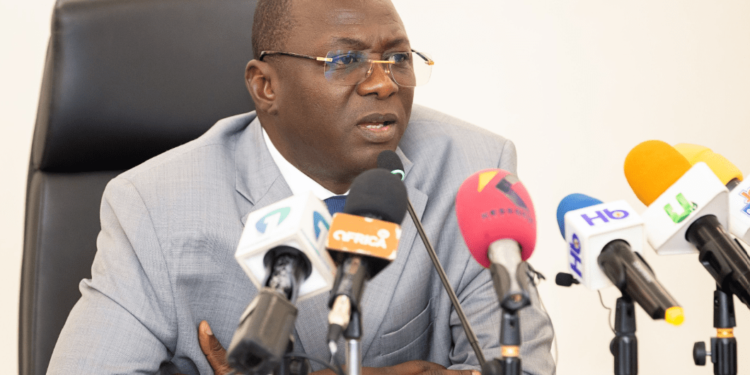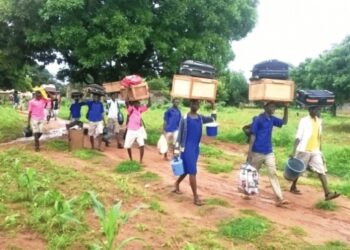If you listened to Finance Minister Dr. Mohammed Amin Adam’s recent claims that the NPP is handing over a “resilient economy” to the incoming Mahama administration, you’d think Ghana has suddenly transformed into an economic paradise.
Unfortunately, the Finance Minister’s comments are not only disingenuous but a painful insult to the intelligence of the Ghanaian people, who continue to bear the brunt of years of economic mismanagement.
Let’s break down the fiction and the reality
1. Inflation is not under control
The Minister boasts about reducing inflation from a peak of 54% in 2022 to 23% in 2024.
What he fails to mention is the devastating impact that runaway inflation has already had on ordinary Ghanaians’ purchasing power. Prices remain astronomically high, and even with a downward trend, Ghana still faces one of the highest inflation rates in Africa. Context matters.
IMF reports confirm that inflation has declined slower than projected because of a weaker cedi and systemic structural failures in monetary management (IMF Report, 2024). In fact, IMF data shows that inflation will remain stubbornly high until at least 2025, exposing the fragility of the so-called “resilient economy.”
The Ministry of Finance’s recent report titled “Ghana’s Economic Surge: Q3 2024 Growth Outpaces Expectations“ tries to sell an overly rosy image of the economy. It claims a “5.1% GDP growth in Q3” and praises strong performance in construction, ICT, and mining. But the reality is far less glamorous. This growth is skewed heavily toward extractive sectors, with limited trickle-down benefits to everyday Ghanaians. Where are the jobs? Where is the relief for SMEs that continue to face exorbitant borrowing costs and limited access to capital?
Moreover, the report glosses over the structural challenges that persist—including energy sector inefficiencies and the weak agriculture performance caused by the recent dry spell, as highlighted in IMF assessments.
2. The Cedi is still in a free fall
Despite claims of improved foreign reserves (now $8 billion), the cedi remains vulnerable to external shocks. Let’s not forget that in 2023, the currency lost over 50% of its value at one point. Even in 2024, the IMF’s third review report of Ghana’s Extended Credit Facility (ECF) highlights that exchange rate volatility persists. Ghanaians can attest to this whenever they visit forex bureaus or see import-dependent goods skyrocket in price.
While the Bank of Ghana has spent valuable reserves propping up the cedi, this is no permanent solution. Reserves are being used as a plaster, not a cure.
The Ministry’s report claims “a stable cedi in Q3 2024 (MoF Q3 Report),” but this narrative ignores the artificial measures propping it up. Without robust structural reforms and sustainable revenue growth, the cedi’s stability remains temporary at best.
3. Debt and IMF dependency paint a grim picture
The NPP administration’s appetite for borrowing has brought Ghana to its knees. Public debt currently stands at 78% of GDP, with domestic debt restructuring and Eurobond renegotiations barely providing breathing space (IMF Report, 2024). The IMF has had to intervene to provide $3 billion to stabilize the economy, a move necessitated by fiscal recklessness.
In an ironic twist, the Finance Minister claims victory because of Ghana’s so-called progress under the IMF program. But let’s be clear: the IMF bailout was the only option after the NPP government plunged the economy into crisis. The same administration that borrowed excessively and spent wastefully now wants credit for securing a rescue package?
4. The energy sector is still a fiscal black hole
Dr. Adam conveniently sidestepped one of Ghana’s biggest economic headaches—the energy sector.
The IMF reports that energy sector shortfalls are projected to hit 2.2% of GDP in 2024, largely due to poor governance, inefficiency, and costly liquid fuel procurement.
The Electricity Company of Ghana (ECG) continues to accumulate arrears, undermining efforts to resolve the sector’s legacy debts. This is not resilience; it’s unsustainable chaos. And that doesn’t even take into consideration the debt owed Hubtel – which they would surely come to claim despite all the issues surrounding the contract.
5. Unemployment and poverty are worse than ever
Ghana’s economic woes have pushed many citizens into poverty. The IMF estimates that 29.5% of Ghanaians now live below the extreme poverty line, a stark increase from previous years. The government’s flagship programs have failed to create enough jobs to match population growth, and the private sector’s struggles further deepen the crisis.
The Ministry of Finance’s Q3 report ignores these glaring poverty numbers, instead touting a rise in employment in specific sectors like mining and construction. But these gains are highly localized and exclude the informal economy, where most Ghanaians work. People on the ground know the truth: poverty has worsened, not improved.
On social media, people like Alfredo (@CallmeAlfredo) and Jerome (@readjerome) highlight the stark realities of hardship under the NPP.Alfredo rightly points out that economic recovery is cosmetic when the average Ghanaian cannot afford basic goods. Jerome calls out the administration for spinning numbers to paint a false picture of stability, despite the clear evidence of debt and inflation eroding livelihoods.
I doff my hat to these two; they are doing a thankless job—a job that should be done by us, the media—but that is a tale for another day.
6. The facts speak louder than propaganda
The Finance Minister’s narrative of a “resilient economy” is nothing but a rebranding exercise in damage control. The IMF, World Bank, and real-world indicators all tell a different story: Ghana’s economy remains fragile, burdened by debt, inflation, unemployment, and structural inefficiencies.
The Ministry of Finance’s Q3 report is a prime example of cherry-picking statistics to paint an unrealistic picture – and Dr Amin Adam’s comments in the media are surely supposed to serve as the cementing to hold that in place. But Ghanaians deserve transparency, not spin.
The NPP administration leaves behind an economy on life support—one that will require bold and responsible leadership to recover. It is dishonest to claim otherwise.
And it is our solemn duty to challenge these false narratives and hold leaders accountable – after all, we are asked to be citizens and not spectators. Ghanaians deserve better than economic spin. They deserve the truth.







